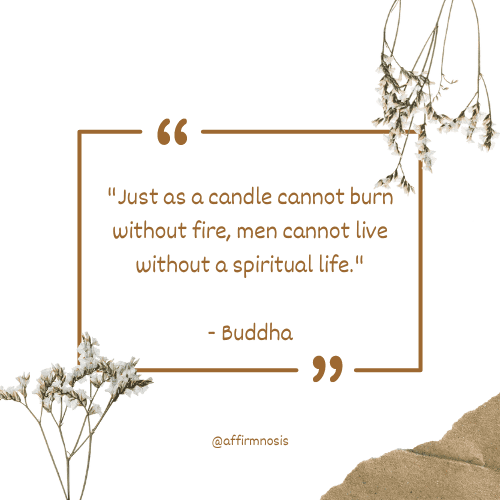Spiritual growth is the process of becoming more aware of your inner self and connecting with a higher power or divine energy. It involves exploring your beliefs, values, and purpose in life and developing a deeper understanding of yourself and the world around you. This journey towards spiritual growth is deeply personal, unique to each individual, and often lifelong.
At its core, spiritual growth is about finding meaning, purpose, and fulfilment in life that goes beyond material possessions or external achievements. It’s about cultivating inner peace, joy, love, compassion, gratitude—qualities that enrich our lives and help us navigate through difficult times.
The Importance of Spiritual Growth in Personal Development
Personal development is the ongoing process of improving oneself to achieve one’s full potential. While there are many ways to approach personal development – such as improving physical health or building career skills – spiritual growth plays a vital role in this journey. Spiritual growth brings clarity to our goals and values.
It helps us understand what truly matters to us on a deeper level rather than just following outside influences. By engaging with spirituality we start living more purposefully by setting meaningful goals for ourselves informed by our core beliefs.
Moreover it provides an anchor for when we face difficulties or upheavals in our lives – providing an ever-present source of strength when other sources may falter. For example: In times of great stress we can draw upon our values such as patience or compassion to remain grounded instead of reacting impulsively which could have negative consequences.
An Overview of Different Aspects Of Spiritual Growth
Every individual’s path to spiritual growth is personal due to diversity among faiths/practices/beliefs but there are fundamental aspects that one can expect: – Understanding The Self: This path involves self-reflection through meditation, introspection, and contemplation. It’s about becoming more aware of one’s thoughts and feelings, identifying limiting beliefs and negative thought patterns that may sabotage personal growth.
– Connecting With a Higher Power: This path involves exploring various spiritual practices to connect with a higher power or divine energy. It’s about developing a personal relationship with something greater than oneself and finding meaning and purpose in life through spirituality.
– Practicing Mindfulness: This path is about living in the present moment by letting go of distractions and worries. Incorporating mindfulness into daily routines creates emotional awareness which helps us identify reactions before they occur.
– Serving Others: Helping others fosters compassion, empathy, kindness which all lead to growth as well as contributing to our community. Embarking on this journey towards spiritual growth takes time, effort, patience and lots of self-discovery but the rewards are tremendous – greater self-awareness, inner peace, joy & contentment.
Understanding the Self
Learning to Connect with Oneself through Meditation and Reflection
Spiritual growth begins with a deep understanding of oneself. One powerful way to connect with oneself is through meditation and reflection.
Meditation involves focusing the mind on a particular object, thought, or activity with the goal of achieving mental clarity and emotional stability. Reflection, on the other hand, is an introspective process that involves analysing one’s thoughts, feelings, and actions in order to gain insight into one’s life.
Meditation can be practiced in many forms such as mindfulness meditation or guided meditation. It helps individuals become more self-aware by quieting their minds and allowing them to focus on their inner thoughts and emotions.
This practice can lead to greater clarity about what truly matters in life and what changes need to be made in order to live a more fulfilling existence. Reflection allows individuals to identify patterns of thought and behavior that may be holding them back from achieving their goals.
By reflecting on past experiences, individuals can learn from mistakes and make better choices in the future. It also helps people identify their strengths which they can use as leverage when working towards personal transformation.
Identifying and Overcoming Limiting Beliefs and Negative Thought Patterns
Another crucial aspect of understanding oneself is identifying limiting beliefs or negative thought patterns that may be preventing personal growth. Limiting beliefs are self-imposed restrictions that prevent individuals from achieving their full potential; they often stem from past experiences or external influences such as family or societal expectations.
Negative thought patterns perpetuate limiting beliefs by reinforcing negative self-talk which leads to low self-esteem, anxiety, depression, or other emotional challenges.
Identifying these patterns requires an honest assessment of one’s thoughts; keeping a journal can help individuals recognize cycles of negativity. Once identified, these limiting beliefs must be overcome through positive affirmations, reframing negative thoughts into positive ones, and visualizing desired outcomes.
Affirmations help rewire the brain to think positively while visualization allows individuals to imagine themselves living their best lives. Taking action towards these goals strengthens one’s mental fortitude against limiting beliefs and negative self-talk.
Cultivating Self-Love and Acceptance
Understanding oneself involves cultivating self-love and acceptance. Accepting oneself as is can be difficult; many people struggle with insecurities or feelings of inadequacy. But self-love can be cultivated through practices like mindfulness, self-compassion, and gratitude.
Practicing mindfulness involves being present in the moment without judgment or criticism allowing individuals to fully appreciate themselves and their surroundings. Self-compassion is learning to treat oneself with kindness instead of harshness when faced with challenges.
It involves recognizing that everyone has weaknesses and that it’s okay not to be perfect all the time. Gratitude involves acknowledging all the good things in one’s life instead of focusing on what’s missing or lacking.
It helps individuals develop a more positive outlook on life which fosters resilience against stressors or setbacks. Through these practices, individuals can cultivate increased levels of self-love, acceptance, peace, and happiness which are essential for personal growth at any age.
Connecting with a Higher Power

Exploring various religious or spiritual practices
Exploring different religions and spiritual practices is an excellent way to connect with a higher power. There are thousands of religions and spiritual beliefs around the world, each offering unique ways of connecting with a higher power.
These can include practices like prayer, meditation, chanting, or ritualistic ceremonies. It’s important to keep an open mind when exploring different spiritual paths and to find one that resonates with your beliefs and values.
One popular religious practice is attending church services or temple worship. This provides a supportive community of like-minded individuals who come together to worship a higher power.
It also offers opportunities for personal growth through studying religious texts or discussing spiritual topics with others. Meditation is another powerful tool for connecting with a higher power.
It involves focusing on the present moment and quieting the mind to become more aware of our thoughts and emotions. This helps us become more mindful of our actions and thoughts throughout the day, leading to greater inner peace and a stronger connection with our spirituality.
Developing a personal relationship with a higher power or divine energy
Developing a personal relationship with a higher power can be one of the most rewarding aspects of spiritual growth. When we feel connected to something greater than ourselves, we experience feelings of love, peace, and purpose.
Building this relationship takes time and effort but it can be accomplished in many ways. Prayer is often used as an effective method for developing this relationship by allowing us to communicate directly with our chosen deity or divine energy.
By expressing gratitude for blessings received in life, asking for guidance during challenging times, or simply expressing appreciation for existence itself we can develop deeper connections. Another way to build this connection is through focused introspection such as journaling or reflecting on past experiences—good or bad—and discerning how God has been and continues to work in our lives..
Finding meaning and purpose in life through spirituality
Spirituality can provide an avenue for discovering one’s purpose and meaning in life. By exploring our spiritual beliefs, we can gain a greater understanding of who we are and what we value. This, in turn, can help us discover our unique purpose and mission.
For many people, spirituality is the foundation for their personal sense of meaning and fulfillment in life. It allows them to connect with a higher power, create deeper relationships with others, contribute positively to society, and achieve a sense of inner peace.
Ultimately, the search for meaning becomes one of the most important aspects of spiritual growth as we develop a new understanding that is deeply rooted in our relationship with God or divine energy. Our true purpose becomes more clear, leading to greater joy and fulfilment.
Connecting with a higher power is an essential part of spiritual growth. There are many practices that can help us improve this connection including exploring different religions or spiritual practices, developing personal relationships with higher powers through prayer or introspection or finding meaning through spiritual pursuits.
Regardless of how we choose to connect with something greater than ourselves it will lead us down new paths towards becoming better versions of ourselves ultimately leading us towards achieving our full potential as human beings.
Practicing Mindfulness
Learning to be present in the moment
One of the fundamental aspects of spiritual growth is practicing mindfulness. Mindfulness is the practice of being fully present in the moment, without judgment or distraction. It involves paying attention to your thoughts, feelings, and surroundings without reacting to them.
By doing so, you can learn to become more aware of your habitual thought patterns and behaviors that might be hindering your personal growth. To begin practicing mindfulness, start by setting aside a few minutes each day to sit quietly and focus on your breath.
As you inhale and exhale, bring your attention back to the present moment whenever it drifts away. You might also try other mindfulness techniques such as body scanning or walking meditation.
Letting go of distractions and worries
Another important element of mindfulness is learning how to let go of distractions and worries that can take away from your ability to focus on the present moment. This can be a challenging task at first since our minds are often cluttered with thoughts about past experiences or future concerns.
A helpful strategy for letting go of these distractions is acknowledging them when they arise but choosing not to dwell on them. Instead, try redirecting your thoughts back towards the present experience using techniques such as visualization or positive affirmations.
Incorporating mindfulness into daily routines
Incorporating mindfulness into daily routines can help make these practices habitual and easier to sustain over time. One way to do this is by starting each day with a mindful meditation session before checking email or social media.
You might also try incorporating mindful breathing exercises during moments that would otherwise be wasted time—like standing in line at the grocery store or waiting for an appointment.
It’s important not only to practice mindfulness during quieter moments but also when engaged in various activities throughout the day, such as eating or exercising. Mindful eating involves paying close attention to your senses and the experience of food, while mindful exercise involves being fully present during physical activity, focusing on your breath and the sensations in your body.
Practicing mindfulness is a powerful tool for enhancing spiritual growth. By learning to be present in the moment, letting go of distractions and worries, and incorporating mindfulness into daily routines, you can develop a deeper sense of self-awareness and cultivate more meaningful relationships with others. With practice and patience, mindfulness can become an integral part of your spiritual journey towards personal growth and fulfilment.
Serving Others
Finding ways to give back to the community or help those in need
Serving others is an essential aspect of spiritual growth. It entails finding ways to give back and make a positive impact in one’s community. It can be volunteering at a local charity, donating money or resources, or participating in a clean-up campaign.
No matter how small the contribution may seem, it is an act of kindness that can go a long way. One way to find opportunities for serving others is by researching local charities and non-profit organizations that align with your values and interests.
You can also attend community events and meetings to learn about upcoming initiatives that require volunteers. Additionally, you can create your own initiative aimed at addressing a specific issue in your community.
Cultivating compassion and empathy towards others
Compassion and empathy are crucial elements of serving others. Being able to put oneself in another person’s shoes allows for a deeper understanding of their struggles and motivates us to help them cope better. Compassion involves showing kindness, care, and concern towards others without any expectation of reciprocity.
To cultivate compassion, it is important first to practice self-compassion by treating oneself kindly and with understanding when facing personal challenges or setbacks. This practice helps develop empathy by extending the same level of kindness towards others as we would want for ourselves.
Finding fulfilment through serving others
Serving others not only benefits those who receive our assistance but also brings fulfilment into our lives. Helping others creates positive emotions such as joy, contentment, gratitude which enhance overall well-being.
When we serve others selflessly without expecting anything in return, we experience a sense of purpose beyond ourselves. This purpose brings greater meaning into our lives as we realize that we are part of something more significant than just our individual selves.
Developing Positive Relationships
Creating Meaningful Connections
Developing positive relationships is a crucial component of spiritual growth. Humans are social creatures and thrive on meaningful connections with others. Building genuine relationships that are based on mutual respect, honesty, and trust can be one of the most rewarding experiences in life.
Meaningful connections provide us with a sense of belonging, purpose and fulfilment. Creating meaningful connections requires an open mind and heart.
One must be willing to share their vulnerabilities, listen actively and empathize with others. By being present in conversations, we can build rapport that helps us create deeper connections with people around us.
In addition to active listening, it is also important to practice gratitude towards the people who enrich our lives. Often, we take our close relationships for granted but expressing gratitude through small gestures like saying thank you or writing a note can strengthen the bond between individuals.
Effective Communication for Conflict Resolution
Communication plays a fundamental role in building positive relationships with others. It is especially important when resolving conflicts between two parties – effective communication can help individuals to resolve conflicts peacefully without causing any harm to the relationship.
To communicate effectively during conflict resolution, one should listen actively by giving their full attention to the other person’s perspective without interrupting them. One should also validate the other person’s feelings by acknowledging how they feel about the situation without invalidating their feelings or opinions.
When communicating during conflict resolution, it’s essential to use “I” statements instead of “you” statements which may come off as accusatory or blaming towards others involved in the conflict. “I” statements convey how you feel about a situation without placing blame on anyone else involved.
It’s important when communicating during conflict resolution that both parties remain calm and respectful towards each other while finding common ground for a mutually beneficial outcome.
Fostering an Environment of Positivity, Love, and Support
People gravitate towards environments that make them feel safe, appreciated and validated. Fostering an environment of positivity, love, and support involves creating a welcoming space where individuals can express themselves freely without fear of judgment or criticism.
One way to foster a positive environment is by promoting positivity through daily affirmations or by sharing inspirational quotes with each other.
Creating opportunities for shared experiences like outings with friends or team sports can also help build closer relationships. Another way to promote positivity is by practicing compassion towards yourself as well as others.
Recognizing the humanity in others and treating everyone with kindness creates an atmosphere of love and support that nourishes spiritual growth within all individuals involved. Developing positive relationships is a crucial aspect of our spiritual journey.
True fulfilment comes from building meaningful connections with people around us while fostering an environment of positivity, love, and support. Effective communication skills play an essential role in conflict resolution which maintains healthy relationships even during tough times.
Encouragement for readers to embark on their own journey towards spiritual growth.
Embarking on a journey towards spiritual growth is not an easy task; it requires courage to confront oneself and the willingness to make an effort every day. However daunting it may seem at first glance though, it is important to remember that everyone has the potential to grow spiritually.
It may be helpful to start by exploring different practices such as meditation or prayer or by reading books about personal development.
Establishing new habits like daily journaling or even just taking time for yourself every day can also be useful tools in fostering personal growth. It’s important to take things at your own pace though; there’s no rush when it comes to personal development.
The journey towards spiritual growth is one that will undoubtedly bring challenges along the way but also many rewards. In facing these challenges head-on though comes newfound strength and resilience which will only encourage continued progress.
Reminder that it is a lifelong process that requires patience, dedication, and continuous effort
It’s important to remember that the path towards spiritual growth is not a one-time effort, but rather a continuous process. This process requires not only patience and dedication but also the willingness to confront oneself and take responsibility for one’s own actions.
Additionally, it’s important to recognize that everyone will have their own unique journey towards spiritual growth; what works for one person may not work for another.
It’s essential to be open-minded, take things at your own pace, and never give up on the journey towards personal development. Embarking on a journey towards spiritual growth is an excellent way to cultivate inner peace and happiness while creating positive changes in your life.
With patience, dedication, and consistent effort comes immense rewards and newfound resilience in the face of challenges. By embracing this lifelong process of personal growth, individuals are sure to find fulfilment in both their personal lives as well as their relationships with others.
Quotes from notable individuals on the topic of spiritual growth:
- “The spiritual journey is the unlearning of fear and the acceptance of love.” – Marianne Williamson
- “Just as a candle cannot burn without fire, men cannot live without a spiritual life.” – Buddha
- “The spiritual life does not remove us from the world but leads us deeper into it.” – Henri J.M. Nouwen
- “Spiritual growth involves giving up the stories of your past so the universe can write a new one.” – Marianne Williamson
- “The spiritual path – is simply the journey of living our lives. Everyone is on a spiritual path; most people just don’t know it.” – Marianne Williamson
- “The spiritual journey is individual, highly personal. It can’t be organized or regulated. It isn’t true that everyone should follow one path. Listen to your own truth.” – Ram Dass
- “The degree of freedom from unwanted thoughts and the degree of concentration on a single thought are the measures to gauge spiritual progress.” – Ramana Maharshi
- “The spiritual journey is not about acquiring something outside yourself. Rather, you are penetrating the layers and veils to return to the deepest truth of your own being.” – Ram Dass
- “Spiritual growth requires the development of inner knowing and inner authority. It requires the heart, not the intellect.” – Gary Zukav
- “Spiritual progress is like a detoxification.” – Marianne Williamson
- “The road to spiritual enlightenment is an individual experience. Your path isn’t like anyone else’s and it’s none of their business.” – Paulo Coelho
- “The spiritual journey is a constant initiation and movement from fear to love.” – Marianne Williamson
- “Growth is the only evidence of life.” – John Henry Newman
- “The spiritual journey is one of constant transformation. To grow, you must give up the struggle to remain the same, and learn to embrace change at all times.” – Michael A. Singer
- “The path to spiritual growth is not about finding the truth but about losing your belief in the untrue.” – Deepak Chopra
- “Spiritual growth is not made in reaction against, for all striving against imposed restrictions is imaginary.” – Swami Vivekananda
- “Spiritual growth and spirituality always seem suspect to some people.” – Marianne Williamson
- “The spiritual journey does not consist of arriving at a new destination where a person gains what he did not have, or becomes what he is not. It consists in the dissipation of one’s own ignorance concerning oneself and life, and the gradual growth of that understanding which begins the spiritual awakening.” – Aldous Huxley
- “Spiritual growth is the most important thing in our lives.” – Eben Alexander
- “The spiritual path wrecks the body and afterwards restores it to health. It destroys the house to unearth the treasure, and with that treasure builds it better than before.” – Rumi
These quotes emphasize the personal nature of the spiritual journey, the importance of inner growth, and the transformative power of spiritual awakening.




























































